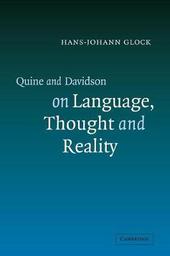
|
Quine and Davidson on Language, Thought and Reality
Paperback / softback
Main Details
| Title |
Quine and Davidson on Language, Thought and Reality
|
| Authors and Contributors |
By (author) Hans-Johann Glock
|
| Physical Properties |
| Format:Paperback / softback | | Pages:328 | | Dimensions(mm): Height 228,Width 153 |
|
| Category/Genre | Western philosophy from c 1900 to now |
|---|
| ISBN/Barcode |
9780521048057
|
| Classifications | Dewey:191 |
|---|
| Audience | | Professional & Vocational | |
|---|
| Illustrations |
Worked examples or Exercises
|
|
Publishing Details |
| Publisher |
Cambridge University Press
|
| Imprint |
Cambridge University Press
|
| Publication Date |
3 January 2008 |
| Publication Country |
United Kingdom
|
Description
Quine and Davidson are among the leading thinkers of the twentieth century. Their influence on contemporary philosophy is second to none, and their impact is also strongly felt in disciplines such as linguistics and psychology. This book is devoted to both of them, but also questions some of their basic assumptions. Hans-Johann Glock critically scrutinizes their ideas on ontology, truth, necessity, meaning and interpretation, thought and language, and shows that their attempts to accommodate meaning and thought within a naturalistic framework, either by impugning them as unclear or by extracting them from physical facts, are ultimately unsuccessful. His discussion includes interesting comparisons of Quine and Davidson with other philosophers, particularly Wittgenstein, and also offers detailed accounts of central issues in contemporary analytic philosophy, such as the nature of truth and of meaning and interpretation, and the relation between thought and language.
Author Biography
Hans-Johann Glock is Reader in Philosophy at the University of Reading. He is the author of A Wittgenstein Dictionary (1996) which has been translated into German, French, Portuguese and Polish.
Reviews'Glock's book is one that every philosopher should have on his or her shelf, and most will find it an enjoyable and illuminating work ... It is admirably clear, insightful and provides critical overviews of the most important arguments of two of the most influential philosophers of the twentieth century, from the point of view of a critic rather than a sympathizer. There is something valuable here for everyone, whether friend or foe of Quine or Davidson.' Notre Dame Philosophical Review
|